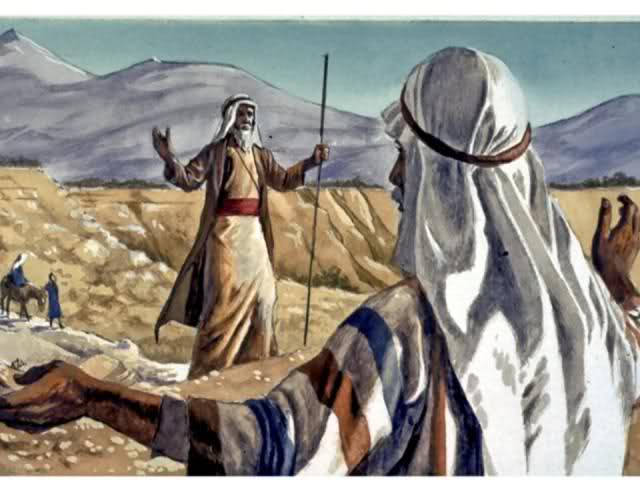As the Oisvorfer was struggling for an opening topic, once again the RBSO came to the rescue. On Tuesday, a very nice member of the ‘umois ho’oilom’ (a gentile), asked for clarity on why Moses was punished by the RBSO and not allowed to enter the Promised Land. He and his bible-study partner were reviewing Moses and thought that he was punished for losing his temper and Yelling at the Yiddin. And while that question is premature for our review as the Yiddin are -in this week’s parsha- still enslaved, the Oisvorfer did set him straight by advising that Moishe seemingly sinned by hitting the rock -twice- instead of speaking softly and asking it to produce water for the thirsty Yiddin. The Oisvorfer then handed the goy his Art Scroll chumish and asked him to read the commentary which further detailed Moishe’s minor yet grave sin. Grada he loved the elucidation provided by Rabaynu Art Scroll and stated that he would place an order. And taka, now that kimat all Yiddin have already purchased at least one, perhaps they should market one for the goyim? Mistama, they can get a major sponsor, ver veyst. Ober was there another reason Moishe was punished? And what has all that to do with this week’s parshas of Vo’eiro? Nu, believe it or not, the goy’s question was timely.
Let’s see what Rashi had to say in the very first posik (Shemois 6:2) of the parsha. Says the heylige Toirah (Shemois 6:2) azoy:
| 2. God spoke to Moses, and He said to him, “I am the Lord.” |
בוַיְדַבֵּר אֱלֹהִים אֶל משֶׁה וַיֹּאמֶר אֵלָיו אֲנִי יְהֹוָה: |
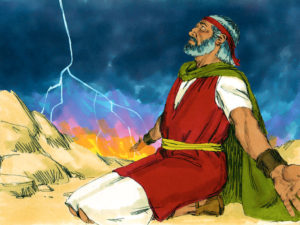
Says Rashi: The RBSO spoke to Moishe in a harsh tone, He was not happy with His new agent. Why? Because as parshas Shemois was coming to an end, Moishe, following his first encounter with Paroy which resulted in yet harsher conditions being placed on the Yiddin, complained to the RBSO and said (Shemois 5:22, but only three pisukim back),”….Lomo Harayoiso…” (why did You make things worse for the Yiddin?) Ober, didn’t the RBSO forewarn Moishe by telling him that Paroy would not honor his request, that Paroy, big minuvil that he was, would give Moishe short shrift? Indeed he did. And if he did, why take did Moishe go back to the RBSO with an accusatory tone and harsh words?
Our parsha then begins with the RBSO’s response, grada a long one, and is according to Rashi, a rebuke of Moishe’s words. Says the medrish referenced by Rashi (Shemois Rabbah 5:22) that mamish as a result of his complaint, and the words he used to express himself, Moishe was already destined to be punished (40 years from now) by having his passport and Visa into the land, cancelled. Words and how they are used, especially when one is angry, seemingly matter. Shoin taka a good lesson to be learned.
Ober, lest you think that Moishe was stam azoy being chutzpadik (a wisenheimer), let’s avada recall that Moishe mamish felt the pain of his brethren. He had real empathy for their plight going back to his youth when he went out and witnessed a Mitzri beating a hapless Yid. He could not control himself and whacked the goy. Even after being away from them for decades, Moishe, seeing their plight, their unjust slave conditions, could not control his emotions and therefore efsher spoke a bit harshly to the RBSO by asking why did You make their conditions worse. And taka one medrish gives us a better pshat on what went down in the RBSO’s response. The RBSO began by using the harsher word of ‘Vayiadabare”, typically associated in our heylige Toirah with justice – meaning in plain English- that the RBSO was angry and ready to judge Moishe for his words, ober immediately recognized where Moishe was coming from, that his heart was in the right place and that only his mouth may have misspoken. Therefore, a word or two later the RBSO then switched to ‘Vayoimer’ which connotes a softer and warmer response. Nonetheless, lesson still learned. Though he had good intentions, the RBSO was still momentarily (or longer) upset that Moishe questioned Him with those words. The first medrish tells us that Moishe eventually paid the price.
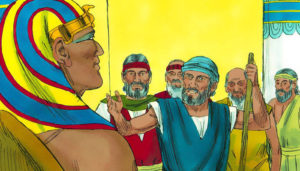
While last week’s parsha of Shemois, covered a period of at least 116 and more likely a full 210 years, all the events in this week’s parsha of Vo’eiro unfolded over a seven month period during which the RBSO flexed His muscles and made good on threats He had made against Paroy. Though the RBSO forewarned Avrohom about the coming Egyptian enslavement, He was quite angry with Paroy for going above and beyond, and making the lives of His soon to be Chosen People quite miserable. The RBSO did not forget: the Mitzrim (Egyptians) were in for a good and well-deserved schmiessing. The RBSO remembering those who anger Him, does not bode well for us, if you chap. Yikes!
Let’s recall: last week, we read of the enslavement, the harsh working conditions, and the hiring of Moishe at the age of eighty to leave his cushy job as a shepherd over in Midyan and head back to Mitzrayim where some decades back he was wanted for murder. He was the appointed redeemer. After a week-long negotiation with the RBSO during which Moishe tried valiantly begging off the assignment, he was on his way. Together with his older brother Aharoin who was hired -perhaps twice as we shall read below- to be his mouthpiece due mostly to Moishe’s self proclaimed speech impediment, which as an aside, gave birth to the speech therapy specialty and profession, Moishe and Aharoin did make their first of many appearances before Paroy and demanded that he let the Jewish People out. Paroy refused! Moreover, so pissed off was he at their ludicrous demand, he took the opportunity to make their working conditions even harsher thereby further angering the RBSO and setting the stage, in our parsha, for seven of the ten Makos (plagues) the RBSO had in His Paroy playbook. They are vividly described. The last three, including the big one, killing of the firstborn, will unfold next week, and by the end of next week’s parsha of Boi, the Yiddin will have left Mitzrayim and will be on their way to the Promised Land, or so they thought. Ober, chap nisht.
Aside from the makos, parshas Vo’eiro is perhaps most well known for having given birth the annual dinking of the four cups of wine at the Pesach Seder, or Seders, if you live and celebrate Pesach anyplace in the world outside of Israel. It’s in Vo’eiro, during a discussion where the RBSO was boosting Moishe’s morale – which was somewhat deflated following his first encounter with Paroy- where the RBSO used the four ‘expressions of redemption’ and which our rabbis later in the heylige Gemora and elsewhere decided are tied directly to the obligation of every Yid to drink four cups of wine at Seder. Nu, anyone that went to yeshiva, even those who spent their time roaming the hallways, shooting spitballs at the rebbe, daydreaming about mydlich, or anything else, knows these four expressions. Ober does everyone agree that these four words or expressions of freedom to come, are the source for us drinking the four cups of wine? Of course not! Are there other words or expressions that gave birth to the obligation to imbibe four cups of wine? Nu, let’s begin with a quick review of pisukim 6-7 as found in the parsha which state azoy:
| 6. Therefore, say to the children of Israel, ‘I am the Lord, and I will take you out from under the burdens of the Egyptians, and I will save you from their labor, and I will redeem you with an outstretched arm and with great judgments. |
ולָכֵן אֱמֹר לִבְנֵי יִשְׂרָאֵל אֲנִי יְהֹוָה וְהוֹצֵאתִי אֶתְכֶם מִתַּחַת סִבְלֹת מִצְרַיִם וְהִצַּלְתִּי אֶתְכֶם מֵעֲבֹדָתָם וְגָאַלְתִּי אֶתְכֶם בִּזְרוֹעַ נְטוּיָה וּבִשְׁפָטִים גְּדֹלִים: |
| 7. And I will take you to Me as a people, and I will be a God to you, and you will know that I am the Lord your God, Who has brought you out from under the burdens of the Egyptians. |
זוְלָקַחְתִּי אֶתְכֶם לִי לְעָם וְהָיִיתִי לָכֶם לֵאלֹהִים וִידַעְתֶּם כִּי אֲנִי יְהֹוָה אֱלֹהֵיכֶם הַמּוֹצִיא אֶתְכֶם מִתַּחַת סִבְלוֹת מִצְרָיִם: |
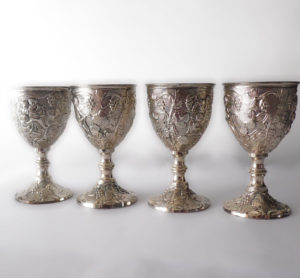
Says Rashi and also says the Rashbam (Rashi’s givaldige grandson) in the heylige Gemora (Pisochim 99b), azoy: the four expressions (in bold) are the source for the obligation on each of us to drink four cups, or goblets, of wine at the Seder. Ober, says Rav Shmuel bar Nachmeini: it’s not so. We drink the four cups because they correspond to the word ‘kosee’ (meaning goblet) found four times – what a surprise- in parshas Vayeshev, when the wine butler, then imprisoned, was recounting his dream to Yoisef and Yoisef’s subsequent interpretation. Wait: there’s more. Says Rebbe Yihoishua ben Levi: it’s really not so: the four goblets we drink correspond instead to the four ‘giulas’ (salvations) mentioned in Tihilim (Psalms). And says another source that we are obligated to drink four goblets of wine at the seder because the word ‘goviah’ (cup or goblet) is mentioned four times in parshas Miketz. Where? In Miketz where Yoisef, still toying and playing psychological warfare with the brothers who plotted to kill him, instructed a staff member to place his own goblet into the sack of his unsuspecting younger brother Binyomin.
Which is it? Why in fact do we drink four, or only four? Ver veyst! Nu, some say that the obligation to drink four cups is only biblically commanded on those staying home for Pesach, those without housekeepers, those having to spend Pesach with the shvigger (mother-in-law), and those whose kids take pleasure in elongating the Seder by asking the same questions they have been asking for over twenty years and which were previously answered. Nu, all these opinions got the Oisvorfer thinking azoy: efsher we should drink 16 cups of wine to ensure proper observance of this mitzvah lichol hadayos (according to all opinions). Grada, according to the Oisvorfer’s chaver and others who claim that each medrish is true and that each opinion given in the heylige Gemora or elsewhere is holy and emes, wouldn’t a requirement to drink 16 goblets make sense? Nu, after four or more cups, everything makes either more, or no sense at all.
By the end of next week’s parsha, the Yiddin will be free, ober chap nisht. Whatever the reason we drink four cups of wine, the bottom line of the expressions is this: freedom from slavery gave us the great Yom Tov of Pesach and all its trimmings. They include: vacation (at times paid for by others), travel, new clothing, sitting poolside, and in general relaxing while enjoying and recalling the freedom our ancestors enjoyed after years of slavery. Exactly how we commemorate the hardships the Yiddin suffered by falling asleep at the Seder table, complaining bitterly about the two and sometimes three day yom tov, stuffing our faces at the buffet as if it was a last meal, interrupted only by multiple trips to the tea room and bathroom, nu, this is yet to be fully understood. Ober early Toirah inspired entrepreneurs already chapped that this entire Exodus myseh (story) meant one thing only: big business. From books and movies, to the yearly printing of the Hagodo Shel Pesach in every size, color and variety, to the entire wine and matzo business, hotels, travel, clothing, and of course the Afikoimon, no other holiday entails so much money as does Pesach: there’s no business like Pesach business! Of course it’s also important to eat out in your favorite restaurant a few days before and after. The Oisvorfer will avada have more to say on this topic ober not today. Shoin, let’s learn.
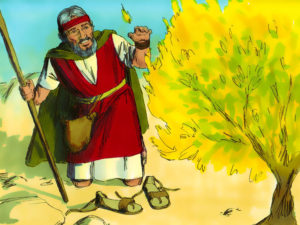
As the parsha opens, Moishe is still resisting his marching orders. What’s pshat that Moishe tried talking his way out of the assignment? Can you just imagine having a face to face encounter with the RBSO and saying no? What was he thinking, and was this not the height of chutzpah? He just barely escaped with his life after being swallowed up by the snake and he has the temerity to say no to the RBSO?! It’s one thing to ignore the eishes chayil, ober the RBSO? Why did Moishe refuse to do the RBSO’s bidding? Ver veyst: mistama this was, as is everything else, just part of the big plan and who says we have to understand? Our job is but to believe.
Wasn’t it but one week ago that Moishe had his first encounter with the RBSO at the burning bush? It was! There he was instructed to accept the job offer and go save the Yiddin from slavery. Moishe resisted and came up with excuses as to why he wasn’t fit for the job. In fact, unlike the missing details of Moishe’s life – decades mamish- the subject of Moishe’s interviews for the redeemer job is covered in great detail. One can mamish feel each experience as Moishe debated the RBSO and told Him that he is not qualified. Said Moishe brazenly: I have a speech impediment. Believe it or not, the RBSO accepted the argument and instructed Moishe to bring along his older brother Aharoin, who would act as his mouthpiece. Moishe went with representation; was Aharoin the world’s first ever attorney? Ver veyst! Moishe and Aharoin did their job and told the Yiddin they came to save them from bondage. The people believed. Ober their first Paroy encounter did not go as planned. Aharoin spoke and Moishe performed the given signs as instructed. Some of course say that Aharoin did the signs as well. Who did them? Ver veyst? Were we there? No! Paroy wasn’t impressed and refused to let the people go.
Ober the RBSO made up His mind: the Yiddin were to go free and Moishe had a job to do. Moishe then repeated his last argument. Said he: the Yiddin did not listen to me, Paroy certainly won’t. Moishe came back with the same speech impediment argument (Vo’eiro 6: 10-12). The RBSO listened and again commanded Moishe to go and Aharoin would be his spokesman (6:13).
A few taka ask why we have so much detail. Every argument between the RBSO and Moishe is repeated and visualized. A few are also wondering why it was necessary for the heylige Toirah which doesn’t have any extra words- some say not even one extra letter- to tell us twice that Aharoin was hired for the same job. And taka asks the Rashbam: this is the same event that took place in last week’s parsha, why repeat it here? Seemingly, most others suggest that indeed Aharoin was hired twice.
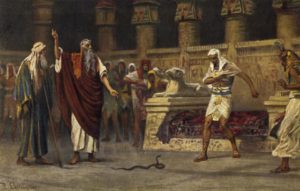
Says the RambaN: In the beginning, Moishe refused and the RBSO sent Aharoin with him. Moishe thought that Aharoin would act as his spokesman all the time. Ober as parshas Vo’eiro begins, the RBSO was talking to Moishe alone and this time Moishe listened and went alone. But the Yiddin didn’t listen. Then the RBSO commanded Moishe to go to Paroy without mentioning Aharoin’s participation. At that point Moishe realized that the RBSO may have fired Aharoin and he was to go alone. Moishe then pulled out the already times tested and proven “I have a speech impediment” trick and suggested to the RBSO that he, Moishe, could not adequately represent the RBSO’s interests primarily because his lips were uncircumcised. Said the RBSO: Moishe will appear in front of Paroy. There he will speak to Aharoin who will repeat the words to Paroy. Aharoin was rehired and became a partner in the redemption.
And says the RambaN azoy: it was an honor to Moishe that he would speak to Paroy through a spokesman. Moishe deserved this because of his extreme modesty. Seemingly, because of his modesty, Moishe attributed the refusal of the Yiddin to listen to his speech impediment rather than the low level of belief that the generation had. Of course you recall that they had sunk to the 40th level of impurity, whatever that means, maybe it impaired their hearing. Therefore, the RBSO sent Aharoin with Moishe to serve as his spokesman.
Avada we all know that Moishe was the appointed leader of the Yiddin. The heylige Gemora refers to him with appellation Rabaynu, the quintessential rabbi/leader, possessing abilities beyond those of most mortals. He was the leader, prophet, and co-redeemer of the Yiddin. Did the Oisvorfer just call him co-redeemer? Indeed he did. Though the movie version had Moishe doing all the heavy lifting and Aharoin kimat (nearly) nothing, it does appear from the words of the heylige Toirah that his older brother Aharoin, was mamish a partner in the process.
Was it not Aharoin who cast down his shtekin when he and Moishe made their first Paroy appearance? Indeed it was and zicher you recall how Aharoin’s shtekin turned into a serpent. Though this little trick didn’t impress Paroy’s sorcerers and magicians, they were a shtikel more impressed when his shtekin/serpent then swallowed their rods. And where was Moishe? Seemingly but standing by and watching the action unfold. Zicher you shouldn’t think that the Oisvorfer is trying to chas v’sholom belittle Moishe’s role and importance, that’s not on the table. What is begin suggested is that Aharoin was more than a minor player and was seemingly hired not once but twice by the RBSO Himself to work closely with Moishe in extracting the Yiddin from Mitzrayim.

Says the RambaM in one of his 13 Principles of Faith azoy: we believe that Moishe’s prophecies are true, and that he was the greatest of the prophets. Where can we find that and why don’t you know this? Why? Because you are mamish an oisvorf and a bum and don’t ever bother to look past the Olaynu prayer in your siddur. Nu, if only you would turn another few pages, there you will find a listing of mamish all 13 of the Rambam’s Principles. Why very few read these, ver veyst.
Earlier we mentioned that Moishe is referred to as Moishe Rabaynu (our teacher / Rabbi). Interestingly, the gematria (numerical value) of the Hebrew letters of these two words is 613, mamish the number of mitzvois the RBSO taught him and that he taught the Yiddin during the Midbar trek of 40 years. Moishe was the only person who ever knew the RBSO face-to-face (Devorim 34:10) and mouth-to-mouth (Bamidbar 12:8), which means that the RBSO spoke to Moishe directly, in plain language, not through visions and dreams, as He communicated with our Ovois (forefathers) and other Niviim (prophets). Nu, back to Aharoin.
Who initiated the makois (plagues), Moishe or Aharoin? Nu lommer lernin (let’s learn). Said the RBSO (Shmois7:19-20). “Say to Aharoin: take your rod and hold out your arm over the waters of Egypt – its rivers, its canals, its ponds, all its bodies of water – that they may turn to blood; there shall be blood throughout the land of Egypt, even in vessels of wood and stone.” Moishe and Aharoin did just as the RBSO commanded: he lifted up the rod and struck the water in the Nile in the sight of Paroy and his courtiers, and all the water in the Nile was turned into blood…Seemingly, it was Aharoin who executed. Veyter: Aharoin held out his arm over the waters of Egypt, and the frogs came up and covered the land of Egypt. And again for mako (plague) number three: Aharoin held out his arm with the rod and struck the dust of the earth, and vermin came upon man and beast; all the dust of the earth turned to lice throughout the land of Egypt. (Shmois 8:13). As an aside, it was the RBSO who initiated the plagues of wild animals and pestilence, both Moishe and Aharoin together initiated boils – this is the first time Moishe steps into this role. Moishe did initiate the plagues of hail and locusts, these two on his own. The emes is that from reading these events, it might suddenly appear that Aharoin’s role is far greater and efsher even more significant, than he is usually credited with having.
Ober says the heylige Toirah (Vo’eiro 6:26-27) “This is Aharoin and Moishe to whom The RBSO said: ‘Take the Children of Israel out of Egypt according to their legions.’ They are the ones who spoke to Paroy, king of Egypt, to take the Children of Israel out of the land of Egypt; this is Moishe and Aharoin.”
Ober which was it? Aharoin and Moishe or Moishe and Aharoin? Who was the greater and who got top billing? Says Rashi: throughout the Toirah, there are places where the Toirah puts Moishe’s name before Aharoin’s, and other times that the Toirah chooses to write Aharoin’s name before Moishe’s. Why? Says Rashi: to convey that they, Moishe and Aharoin were equal in significance. Case closed, seemingly they were equal partners.
Says the Kli Yakar azoy: as we review the entire redemption story, one quickly concludes that Moishe was the main protagonist. He met the RBSO at the s’neh (the burning bush) and was the one specifically appointed by The RBSO Himself as the RBSO’s redeemer messenger. Burning bushes don’t appear regularly, if you chap. And of course he was destined to lead them to Har Sinai to get the heylige Toirah and for the ensuing 40 years. Ober in order to counter such a perspective of the story, the Toirah goes out of its way to tell us that indeed Aharoin played just as much an important role as Moishe.
On the other hand, the heylige Toirah also refers to them as “Moishe and Aharoin”, placing Moishe first so that we taka don’t think that just because Aharoin did most, if not all the talking and also a few makois with his shtekin, that he, maybe because of Moishe’s speech impediment, was the lead redeemer. In other words: they were both great and maybe equal. On the other hand, though Aharoin did most of the talking, seemingly the RBSO treated Moishe differently than any other human being. Do you know anyone that ever seen or encountered a burning bush? Case closed, if you chap.
Though you likely don’t ever get to and zicher not past Olaynu in the siddur, efsher you do recite the Yidgal from time to time and we will close with this quote from the siddur. “There was never anyone in the Jewish people as great as Moishe, nor will there ever be.”
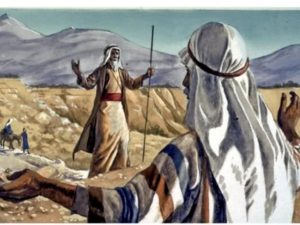 Siman Tov and Mazel Tov! With great pleasure we begin this week with a very special and heartfelt mazel tov to friends of over forty years, Susie and Baruch Singer, upon the upcoming bar mitzvah, this coming shabbis (and continuing with a simchas bar mitzvah on Sunday), of their dear son Yitzchok Aharon. Mazel tov to the entire extended Singer family.
Siman Tov and Mazel Tov! With great pleasure we begin this week with a very special and heartfelt mazel tov to friends of over forty years, Susie and Baruch Singer, upon the upcoming bar mitzvah, this coming shabbis (and continuing with a simchas bar mitzvah on Sunday), of their dear son Yitzchok Aharon. Mazel tov to the entire extended Singer family. Says Rashi: The RBSO spoke to Moishe in a harsh tone, He was not happy with His new agent. Why? Because as parshas Shemois was coming to an end, Moishe, following his first encounter with Paroy which resulted in yet harsher conditions being placed on the Yiddin, complained to the RBSO and said (Shemois 5:22, but only three pisukim back),”….Lomo Harayoiso…” (why did You make things worse for the Yiddin?) Ober, didn’t the RBSO forewarn Moishe by telling him that Paroy would not honor his request, that Paroy, big minuvil that he was, would give Moishe short shrift? Indeed he did. And if he did, why take did Moishe go back to the RBSO with an accusatory tone and harsh words?
Says Rashi: The RBSO spoke to Moishe in a harsh tone, He was not happy with His new agent. Why? Because as parshas Shemois was coming to an end, Moishe, following his first encounter with Paroy which resulted in yet harsher conditions being placed on the Yiddin, complained to the RBSO and said (Shemois 5:22, but only three pisukim back),”….Lomo Harayoiso…” (why did You make things worse for the Yiddin?) Ober, didn’t the RBSO forewarn Moishe by telling him that Paroy would not honor his request, that Paroy, big minuvil that he was, would give Moishe short shrift? Indeed he did. And if he did, why take did Moishe go back to the RBSO with an accusatory tone and harsh words?
 While last week’s parsha of Shemois, covered a period of at least 116 and more likely a full 210 years, all the events in this week’s parsha of Vo’eiro unfolded over a seven month period during which the RBSO flexed His muscles and made good on threats He had made against Paroy. Though the RBSO forewarned Avrohom about the coming Egyptian enslavement, He was quite angry with Paroy for going above and beyond, and making the lives of His soon to be Chosen People quite miserable. The RBSO did not forget: the Mitzrim (Egyptians) were in for a good and well-deserved schmiessing. The RBSO remembering those who anger Him, does not bode well for us, if you chap. Yikes!
While last week’s parsha of Shemois, covered a period of at least 116 and more likely a full 210 years, all the events in this week’s parsha of Vo’eiro unfolded over a seven month period during which the RBSO flexed His muscles and made good on threats He had made against Paroy. Though the RBSO forewarned Avrohom about the coming Egyptian enslavement, He was quite angry with Paroy for going above and beyond, and making the lives of His soon to be Chosen People quite miserable. The RBSO did not forget: the Mitzrim (Egyptians) were in for a good and well-deserved schmiessing. The RBSO remembering those who anger Him, does not bode well for us, if you chap. Yikes! Says Rashi and also says the Rashbam (Rashi’s givaldige grandson) in the heylige Gemora (Pisochim 99b), azoy: the four expressions (in bold) are the source for the obligation on each of us to drink four cups, or goblets, of wine at the Seder. Ober, says Rav Shmuel bar Nachmeini: it’s not so. We drink the four cups because they correspond to the word ‘kosee’ (meaning goblet) found four times – what a surprise- in parshas Vayeshev, when the wine butler, then imprisoned, was recounting his dream to Yoisef and Yoisef’s subsequent interpretation. Wait: there’s more. Says Rebbe Yihoishua ben Levi: it’s really not so: the four goblets we drink correspond instead to the four ‘giulas’ (salvations) mentioned in Tihilim (Psalms). And says another source that we are obligated to drink four goblets of wine at the seder because the word ‘goviah’ (cup or goblet) is mentioned four times in parshas Miketz. Where? In Miketz where Yoisef, still toying and playing psychological warfare with the brothers who plotted to kill him, instructed a staff member to place his own goblet into the sack of his unsuspecting younger brother Binyomin.
Says Rashi and also says the Rashbam (Rashi’s givaldige grandson) in the heylige Gemora (Pisochim 99b), azoy: the four expressions (in bold) are the source for the obligation on each of us to drink four cups, or goblets, of wine at the Seder. Ober, says Rav Shmuel bar Nachmeini: it’s not so. We drink the four cups because they correspond to the word ‘kosee’ (meaning goblet) found four times – what a surprise- in parshas Vayeshev, when the wine butler, then imprisoned, was recounting his dream to Yoisef and Yoisef’s subsequent interpretation. Wait: there’s more. Says Rebbe Yihoishua ben Levi: it’s really not so: the four goblets we drink correspond instead to the four ‘giulas’ (salvations) mentioned in Tihilim (Psalms). And says another source that we are obligated to drink four goblets of wine at the seder because the word ‘goviah’ (cup or goblet) is mentioned four times in parshas Miketz. Where? In Miketz where Yoisef, still toying and playing psychological warfare with the brothers who plotted to kill him, instructed a staff member to place his own goblet into the sack of his unsuspecting younger brother Binyomin. As the parsha opens, Moishe is still resisting his marching orders. What’s pshat that Moishe tried talking his way out of the assignment? Can you just imagine having a face to face encounter with the RBSO and saying no? What was he thinking, and was this not the height of chutzpah? He just barely escaped with his life after being swallowed up by the snake and he has the temerity to say no to the RBSO?! It’s one thing to ignore the eishes chayil, ober the RBSO? Why did Moishe refuse to do the RBSO’s bidding? Ver veyst: mistama this was, as is everything else, just part of the big plan and who says we have to understand? Our job is but to believe.
As the parsha opens, Moishe is still resisting his marching orders. What’s pshat that Moishe tried talking his way out of the assignment? Can you just imagine having a face to face encounter with the RBSO and saying no? What was he thinking, and was this not the height of chutzpah? He just barely escaped with his life after being swallowed up by the snake and he has the temerity to say no to the RBSO?! It’s one thing to ignore the eishes chayil, ober the RBSO? Why did Moishe refuse to do the RBSO’s bidding? Ver veyst: mistama this was, as is everything else, just part of the big plan and who says we have to understand? Our job is but to believe. Says the RambaM in one of his 13 Principles of Faith azoy: we believe that Moishe’s prophecies are true, and that he was the greatest of the prophets. Where can we find that and why don’t you know this? Why? Because you are mamish an oisvorf and a bum and don’t ever bother to look past the Olaynu prayer in your siddur. Nu, if only you would turn another few pages, there you will find a listing of mamish all 13 of the Rambam’s Principles. Why very few read these, ver veyst.
Says the RambaM in one of his 13 Principles of Faith azoy: we believe that Moishe’s prophecies are true, and that he was the greatest of the prophets. Where can we find that and why don’t you know this? Why? Because you are mamish an oisvorf and a bum and don’t ever bother to look past the Olaynu prayer in your siddur. Nu, if only you would turn another few pages, there you will find a listing of mamish all 13 of the Rambam’s Principles. Why very few read these, ver veyst.